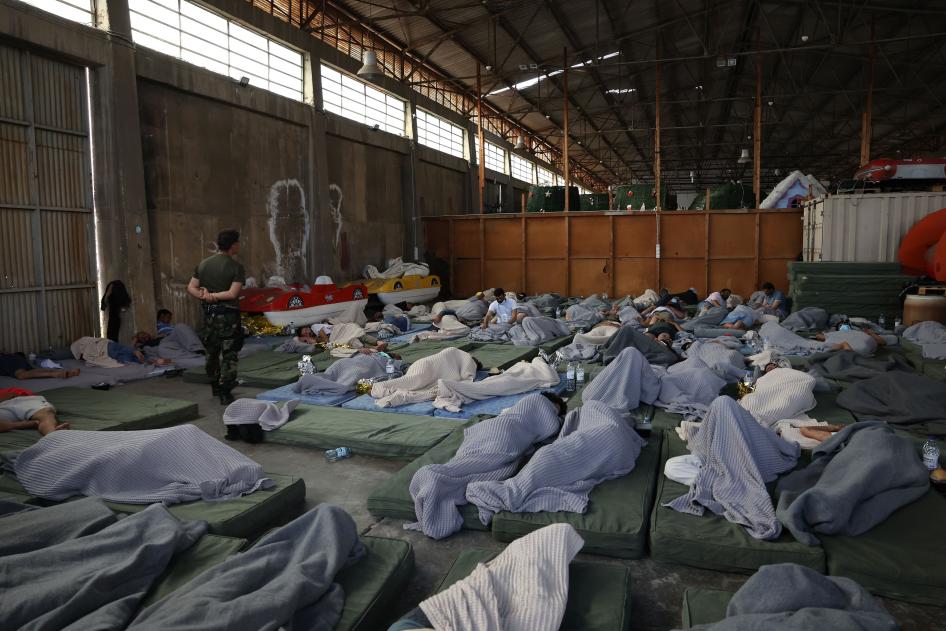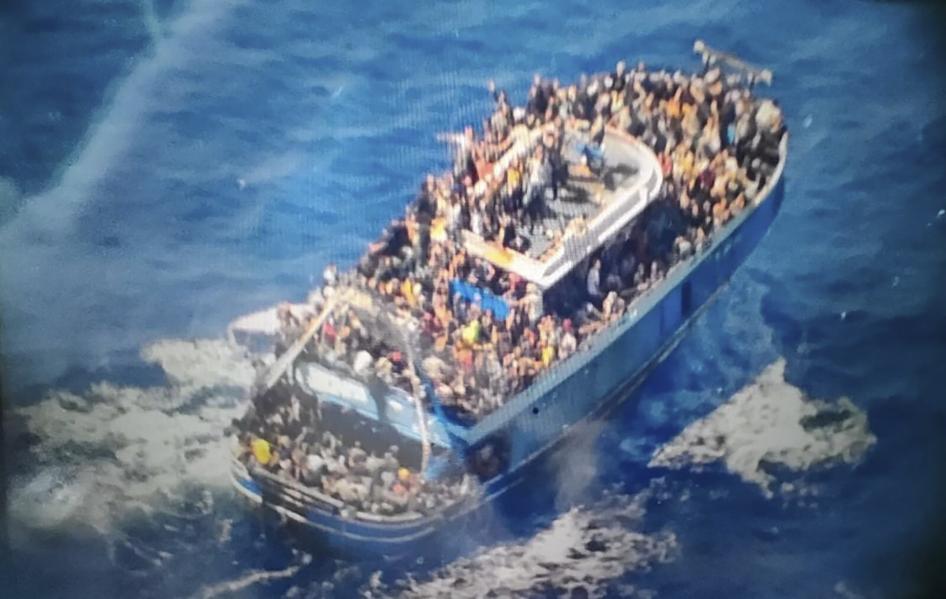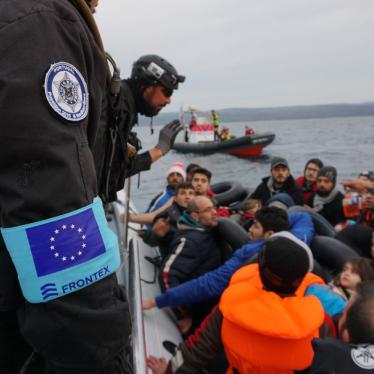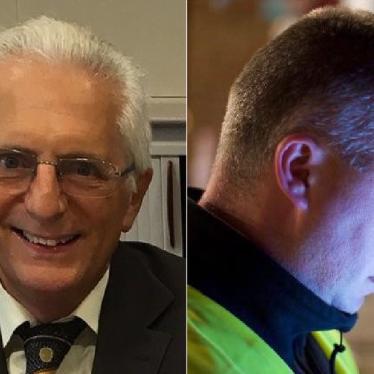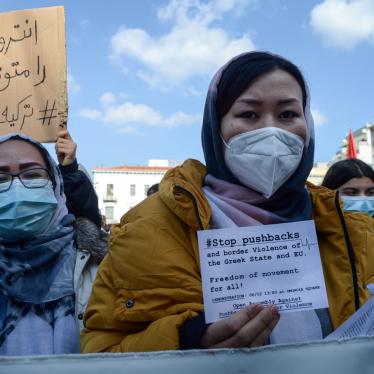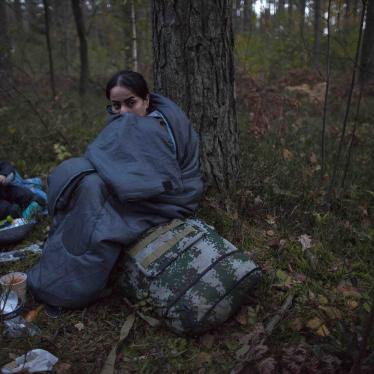(Brussels) – Starkly divergent accounts from survivors and Greek authorities around the circumstances of the deadly Pylos shipwreck underscore the urgent need for an effective, independent, and impartial investigation, Amnesty International and Human Rights Watch said today.
The fishing vessel, Adriana, was carrying an estimated 750 people when it sank on June 14, 2023, off the coast of Pylos. In the aftermath, accounts from several of the 104 survivors suggest that the vessel was towed by a Greek coast guard boat, causing the fatal wreck. The Greek authorities have strongly denied these claims.
“The disparities between survivors’ accounts of the Pylos shipwreck and the authorities’ version of the events are extremely concerning,” said Judith Sunderland, associate Europe and Central Asia director at Human Rights Watch. “The Greek authorities, with support and scrutiny from the international community, should ensure that there is a transparent investigation to provide truth and justice for survivors and families of the victims, and hold those responsible to account.”
On June 13, the European Union border agency Frontex said, its surveillance plane spotted the Adriana at 09:47 UTC (12:47 EEST/in Athens) and alerted authorities in Greece and Italy. In the following hours, two merchant vessels and later a Hellenic Coast Guard vessel interacted with the Adriana. After the boat capsized at around 2 a.m. EEST on 14 June, only 104 survivors, including several children, were rescued.
A delegation from Amnesty International and Human Rights Watch visited Greece between July 4 and 13 as part of ongoing research into the circumstances of the shipwreck and steps toward accountability. They interviewed, 19 survivors of the shipwreck, 4 relatives of the missing, nongovernmental organizations, United Nations and international agencies and organizations, and representatives of the Hellenic Coast Guard and the Greek police.
The organizations’ initial observations confirm the concerns reported by several other reputable sources as to the dynamics of the shipwreck. Survivors interviewed by Amnesty International and Human Rights Watch consistently stated that the Hellenic Coast Guard vessel dispatched to the scene attached a rope to the Adriana and started towing, causing it to sway and then capsize. The survivors also consistently said that passengers asked to be rescued and that they witnessed others on the boat plead for a rescue by satellite phone in the hours before their boat capsized.
In a meeting with Amnesty International and Human Rights Watch, senior officials of the Hellenic Coast Guard said that individuals on the boat limited their request for assistance to food and water and expressed their intention to proceed to Italy. They said the crew of the Coast Guard vessel came close to the Adriana and used a rope to approach the boat to assess whether passengers wanted help, but that after the first “negotiations,” passengers threw the rope back and the boat continued its journey.
Greek authorities have opened two criminal investigations, one targeted at the alleged smugglers and another into the actions of the coast guard. It is vital for these investigations to comply with international human rights standards of impartiality, independence, and effectiveness, Amnesty International and Human Rights Watch said.
To enhance the credibility of judicial investigations both in practice and perception, they should be under the supervision of the Supreme Court Prosecutor’s Office. Further, Greek authorities should ensure that the Greek Ombudsman’s Office is promptly provided with information and resources necessary to carry out its functions as the National Mechanism for Investigating Incidents of Arbitrariness, in relation to any disciplinary investigation.
Several survivors said that the authorities confiscated their phones following the shipwreck but did not give them any related documentation or tell them how to retrieve their property. Nabil, a survivor of Syrian origin, told the organizations: “It’s not only the evidence of the wreck that has been taken from me [but also] … my memories of my friends who were lost, my life has been taken from me.”
Following an order by the head of the Prosecutor’s Office of the Piraeus Naval Court, a prosecutor is currently conducting a preliminary investigation into the conditions of the shipwreck and the potential punishable offenses by members of the Hellenic Coast Guard. The organizations have sought information with the Greek Minister of Maritime Affairs and Insular Policy about any disciplinary investigation opened into the actions of members of the Hellenic Coast Guard.
As part of their ongoing investigation, the organizations sent letters requesting information to several key entities, including the Ministry of Maritime Affairs and Insular Policy, the Prosecutors of the Supreme Court and of the Piraeus Naval Court, and the EU border agency Frontex.
The prosecutor of Kalamata ordered the arrest of nine Egyptian nationals who survived the shipwreck on charges of smuggling, membership in an organized criminal network, manslaughter, and other serious crimes.
The Greek authorities' longstanding failure to ensure accountability for violent and unlawful pushbacks at the country’s borders raises concerns over their ability and willingness to carry out effective and independent investigations, Amnesty International and Human Rights Watch said.
Lessons should be learned from the European Court of Human Rights 2022 decision about the 2014 “Farmakonisi” shipwreck in which survivors argued that their boat had capsized because the Hellenic Coast Guard used dangerous maneuvers to tow them toward Turkish waters. The court condemned Greece for the authorities’ failures in handling rescue operations and for shortcomings in the subsequent investigation of the incident, including how victims’ testimony was handled.
In view of the seriousness and international significance of the Pylos tragedy, Greek authorities should seek out and welcome international and/or European assistance and cooperation in the conduct of national investigations as an additional guarantee of independence, effectiveness, and transparency.
A full and credible investigation into the shipwreck should seek to clarify any responsibility for both the sinking of the ship and delays or shortcomings in the rescue efforts that may have contributed to the appalling loss of life, Amnesty International and Human Rights Watch said. The investigation should involve taking the testimonies of all survivors, under conditions that guarantee their trust and safety.
All forensic evidence, such as traces of communications, videos, and photographs, should be collected, assessed, and safeguarded to facilitate accountability processes. Any property, such as cell phones, taken from survivors for investigative purposes should be appropriately logged and returned within a reasonable amount of time.
All of those involved in or with knowledge of the incident, including the Hellenic Coast Guard, Frontex, the captains and crews of the two merchant vessels, and others who took part in the rescue operation after the shipwreck should be invited or required to testify, as appropriate, and should cooperate fully and promptly with the investigations.
In parallel to the national investigation, the EU Ombudsman has announced that it will open an inquiry into the role of Frontex in search and rescue (SAR) activities in the Mediterranean, including in the Adriana shipwreck. This will pose important questions about the agency’s role, practices, and protocols in the context of SAR operations and on what actions it has taken to comply with its fundamental rights obligations and EU laws during this and other shipwrecks.
Amnesty International and Human Rights Watch are continuing to investigate the Pylos shipwreck and demand justice for all those harmed.
“This preventable tragedy demonstrates the bankruptcy of EU migration policies predicated on racialized exclusion of people on the move and deadly deterrence,” said Esther Major, Senior Research Adviser for Europe at Amnesty International. “To ensure this is the last, and not the latest, in an unconscionably long list of tragedies in the Mediterranean, the EU should reorient its border policies toward rescue at sea and safe and legal routes for asylum seekers, refugees, and migrants.”
